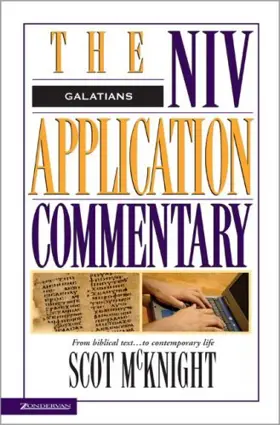

Galatians
Pages
320
Publisher
Zondervan
Published
1/1/1995
ISBN-13
9780310484707
Reviews
McKnight has a strong sense of the history of interpretation of Paul, and Galatians in particular. He is also sensitive to issues facing the Church and the Christian life today.
[Full Review]
A good source for a balanced study of Galatians. McKnight's is comparable with Dunn's in terms of quality commentaries on Galatians from a NPP scholar. McKnight doesn't get into the incredibly complex linguistic issues in detail, but it's hard to fault him for not doing something when it's not within the scope or design of the series. But I do recommend this one (or Dunn) for the NPP interpretation of Galatians.
Scot McKnight's commentary is a good entry in the NIVAC series. It's probably the first commentary that tried to bring the results of the NPP to the average person in the pew. His applications were built off of his new perspective reading and for the most part were very strong, though at times a little dated (a lot has changed in the world since 1995). Even there I think they give good examples we can relate to having experienced in the past and get us thinking on the 'right track.' The original meaning sections were a bit briefer and less technical than some others in the same series, but that's probably a positive given the intended audience. Definitely make sure to check out his lengthy discussion of legalism in his introduction. It's excellent, as is the rest of his discussion of legalism throughout the applications section of the commentary. Until something surpasses it, I would rate McKnight's commentary as the best option for the lay person. Preachers and teachers also would benefit from seeing how McKnight works out his applications of the text.
[Full Review]
Scot McKnight's NIVAC displays some of the strengths of the series, which include (a) presenting the basic message of the book (which in McKnight's case is heavily leaning toward a New Perspective interpretation, where the conflict is seen as being about social boundary markers rather than whether obedience to the law justifies), (b) identifying areas where Paul's language or assumptions involve cultural baggage or historical background that contemporary readers need help understanding and working through ways to help contemporary Christians understand those issues in our own terms, and (c) finding applications for our own day based on how the principles behind the text get transferred into the new context. The series tends to be light on exegesis. I disagree enough with the New Perspective approach that I wouldn't recommend this commentary as much as I would other volumes in the series, but McKnight is a good writer who has thought a lot about how the gospel works itself out in our lives. One reviewer thinks his New Perspective interpretation makes it much harder for him to find contemporary application than it would be if he accepted the traditional approach.
[Full Review]




